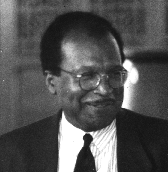
Spring/Summer 1999
Volume 6, Issue 2
Spring/Summer 1998
Volume
3, Issue 1
January 1995
Volume
2, Issue 4
October 1994
Volume
2, Issue 1
January 1994
EAC FOCUS
William A. Lester, Jr.
Senior Fellow for Science and Engineering and Assistant to the Director for Human Resource Development, National Science Foundation
 Trained as a physical chemist, William Lester was committed to this area
of science even before he took his first chemistry course. During his
senior year of high school, Lester worked at the University of Chicago's
Department of Physics office. There, he was exposed to physical chemists
like Nobel-prize winner Robert Mullican, an experience that fueled and
focused his childhood interest in science. In fact, much of his career
has focused on exposure to new research ideas and other disciplines, as
well as on promoting student exposure to science.
Trained as a physical chemist, William Lester was committed to this area
of science even before he took his first chemistry course. During his
senior year of high school, Lester worked at the University of Chicago's
Department of Physics office. There, he was exposed to physical chemists
like Nobel-prize winner Robert Mullican, an experience that fueled and
focused his childhood interest in science. In fact, much of his career
has focused on exposure to new research ideas and other disciplines, as
well as on promoting student exposure to science.
Dr. Lester eventually attended University of Chicago, receiving his bachelor's and master's degrees there in 1958 and 1959, respectively. As an undergraduate, he gained further experience in research by working at an IBM research laboratory. Receiving his Ph.D. from Catholic University in 1964, Lester went on to become a leading researcher in the field of computational chemistry and a strong advocate for science and engineering education.
Lester has published more than 150 papers in this field, has received many honors for his research and teaching, and has advised multiple research organizations. He has served as director of the National Resource for Computational Chemistry (the first national research organization in this field). He has also worked at a broad range of public and private research institutions, including IBM's T. J. Watson and San Jose research centers, Lawrence-Berkeley Laboratory, University of Wisconsin, and the National Bureau of Standards. He has also been active as a member of professional associations, including the American Physical and Chemical Societies and the American Association for the Advancement of Science, and has served on the editorial boards of the Journal of Computational Chemistry and other publications. He currently works at the National Science Foundation (NSF) while on leave from the University of California, Berkeley, where he is associate dean of the College of Chemistry.
Lester's positions at UC-Berkeley and the NSF have underscored his lifelong commitment to science and engineering education. "Providing positive experiences in science for young people is very important," he said. "They really need to know that science is not just taking courses, but doing exciting, challenging work in a very open-ended environment." He even stresses the practical aspects of a career in science and engineering, stating that it is interesting work through which "you can actually make a good living."
Lester has been very committed to CRPC efforts in minority education, participating in the 1994 "Computers: the Machines, People, and Careers!" Workshop at Caltech (see related article in the 4/94 issue of Parallel Computing Research). He addressed a large group of minority high school students, discussed his research, and showed a video of molecular motion simulations. "I really tried to relate what I was saying to everyday experiences that they might have had," he said. He noted that the program, along with most CRPC educational activities, has "expanded the horizons of these students."
As an emeritus member of the CRPC's External Advisory Committee (EAC), he is very supportive of the CRPC's educational and research missions. The EAC, he believes, "should be proactive, give comments and direction to CRPC management, and act as a sounding board for new ideas." Although Lester is no longer an active member of the EAC (as a result of his position at NSF), his input, particularly in educational matters, will continue to have a strong and lasting impact on CRPC operations.
Table of Contents